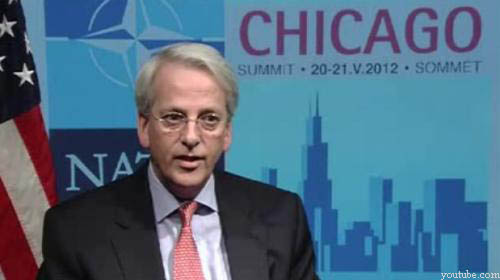
From Chicago Council on Global Affairs: Ambassador Ivo H. Daalder, U.S. Ambassador to NATO and widely recognized national security expert, has been named president of The Chicago Council on Global Affairs. . . .
Daalder, 52, will become The Chicago Council’s president effective July 1, 2013. He will succeed Marshall M. Bouton, whose 12-year presidency transformed the 90-year-old organization into a nationally prominent global affairs institution known for public education and thought leadership.
"We are delighted that Ambassador Daalder has accepted our offer to become The Chicago Council’s next president, and we look forward to his arrival in Chicago this summer," [chairman of the Council Lester] Crown said. "As a thought leader, policy practitioner and visionary, Ivo is a great match for the Council. He shares the Board’s objective of increasing The Chicago Council’s stature as a foremost center of influence on opinion and policy on global affairs."
"I am excited by the opportunity to lead The Chicago Council,” said Daalder. "The Council has a historic role as the forum in Chicago for the discussion of world affairs, as I know well having spoken here in advance of the 2012 NATO summit. I look forward to building on the successes achieved under Marshall Bouton’s leadership and expanding the Council’s role as a widely respected contributor to the national and international discourse and to Chicago’s stature as a global city."
"My experience as NATO ambassador has reinforced the importance of organizations such as The Chicago Council,” Daalder added. "This is precisely the position I had hoped to find at this point in my career. Working closely with the Board, I am confident we can further increase the intellectual capital and the local, national and international visibility of The Chicago Council. My family is eager to move to Chicago, and I look forward to playing an active role in the Chicago community, as I get to know the Council’s leadership and members."
Ivo H. Daalder was appointed U.S. ambassador to NATO by President Barack Obama in May 2009. During his four-year tenure at NATO, Ambassador Daalder helped prepare President Obama and his administration for two summit meetings, including the May 2012 NATO summit in Chicago. He was deeply involved in negotiating NATO’s New Strategic Concept in 2010 and in deliberations surrounding NATO’s successful intervention in Libya in 2011. Ambassador Daalder previously served as director for European affairs on President Clinton’s National Security Council staff from 1995 to 1997, where he was responsible for coordinating U.S. policy toward Bosnia.
Prior to being appointed to his current position, Ambassador Daalder was a senior fellow in foreign policy studies at the Brookings Institution, specializing in American foreign policy, European security and transatlantic relations and national security affairs. He has a long and distinguished scholarly career, authoring twelve books, including most recently, In the Shadow of the Oval Office: Profiles of the National Security Advisers and the Presidents they Served—From JFK to George W. Bush (with I. M. Destler) and the award-winning America Unbound: The Bush Revolution in Foreign Policy (with James M. Lindsay). He has written for the nation’s leading journals and newspapers and has been a frequent commentator on national and global affairs.
Ambassador Daalder was educated at Oxford and Georgetown Universities, and received his Ph.D. in political science from the Massachusetts Institute of Technology. He is married to Elisa D. Harris, and they have two sons, Marc and Michael.
Daalder was chosen after an eight-month search by a committee of the Council’s Board of Directors, led by Henry S. Bienen, president emeritus of Northwestern University.
"The search committee considered dozens of excellent candidates for the position. Ambassador Daalder brings a unique range of talents to the Council," Bienen said. “In Ivo, we found a leader with impeccable policy credentials, keen intellect and the drive and ability to lead the Council at this stage in its development,” Bienen said. (photo: U.S. Department of State)
Image: usg%202%2014%2013%20Ivo%20Daalder_0.jpg
